OUR PROFESSIONALS WILL HELP YOU GET HIGH SCORE IN YOUR MASTER IN BUSINESS ADMINISTRATION PROGRAM
Key Topics
- Master in Business Administration Program Offered by Westcliff University
- Master in Business Administration Program Outcomes
- Master of Business Administration (MBA) Institutional Learning Outcomes
- Online MBA Program Westcliff University Course - Core Competencies
- Westcliff University College of Business Policies
Master in Business Administration Program Offered by Westcliff University
The goal of Westcliff University's Master of Business Administration programme is to deliver a broad spectrum of essential ideas in auxiliary business fields that prepare students to lead people and projects. The curriculum prepares students to design and implement corporate strategy initiatives in an innovative and creative setting while being ethical and professional. If you need help with this course then visit Takemyonlineclassesforme.com.
Before placing an order with us meanwhile, you can learn more about the Master of Business Administration programme at Westcliff University (College of Business).
Master in Business Administration Program Outcomes
Students who pursue a master's degree in business administration must improve both academically and personally, which helps them succeed as classroom teachers. The curriculum's instructional objectives are to:
- Learn about the economics, marketing, accounting, finance, law, organisational behaviour, and leadership to have a broad understanding of business processes.
- Demonstrate how to effectively communicate business analyses and recommendations in writing formats suitable for the intended audience.
- Demonstrate good oral communication of business analysis and recommendations to the target audience by following appropriate conventions and formats.
- Assess current information technology in order to aid firm decision-making.
- Combine autonomy, critical thinking, and reasoning skills to improve problem-solving and decision-making abilities.
- Integrate ethical issues into a business framework and come up with ethically sound solutions.
- To foster critical thinking when learning complicated business ideas, encourage the use of research and information from a range of sources.
- Evaluate, analyse, and communicate quantitative data to improve and sustain strategic business actions.
- Value diversity and a global perspective while making business decisions.
Master of Business Administration (MBA) Institutional Learning Outcomes
Written Communication
Master written language conventions, such as culturally recognised presentation and argument patterns, audience awareness, and other scenario aspects, while integrating texts, facts, and graphics using a range of writing technologies.
Communication through the mouth
Demonstrate compromise by encouraging agreement using informational persuasive and expressive oral communication.
Personality Qualities
Demonstrate behaviours (self-awareness, self-confidence, stress management, resilience, persistence, perseverance, patience, and perceptiveness) that lead to stronger rapport and better human relationships, while also inspiring others to excel in conflict resolution, expectation management, decision-making, and problem-solving.
Thinking Critically
Be open-minded and driven to seek the truth by distinguishing between fact, opinion, and deliberate deception, summarising and creatively integrating difficult themes with insight and thoughtful judgement.
Ethics
To be able to contribute to the global community, become more critically active in global and local concerns, with greater contemplation and analysis of other cultures' and communities' values, assumptions, beliefs, and attitudes.
Information literacy is the ability to understand and use information.
Identify a need for information, critically evaluate others' claims, and increase your ability to summarise findings both collaboratively and independently.
Online MBA Program Westcliff University Course - Core Competencies
| Standard | Outcomes Assessment Categories |
| Core Competencies | Core Competencies sub-categories |
|
1 Written Communication Use of written language for informational, persuasive, and expressive purposes appearing in many forms or genres |
|
|
2 Oral communication Communicating, employing speech, visual aids, body language, intonation, and other non-verbal elements to convey meaning, as presented in speeches, presentations, discussions, dialogue, and other forms of interpersonal communication. |
|
|
3 Interpersonal skills Soft skills used daily to interact properly with individuals and groups, exhibiting proficient listening, questioning, manners, problem-solving, social awareness, responsibility, accountability, assertiveness |
|
|
4 Critical thinking The ability to analyze, synthesize, interpret, and evaluate ideas, information, situations, and texts. It involves separating assertion from evidences in a way that is clear, reasoned, reflective aimed at deciding what to believe or do |
|
|
5 Ethics Adhering to principles that promote moral values, such as trust, good behavior, fairness, and kindness while applying mature judgment in the resolution of ethical dilemmas. |
|
|
6 Information Literacy Abilities of find, evaluate, interpret, manage, and effectively use the information to answer questions and create new knowledge |
|
|
7 Quantitative reasoning Ability to apply mathematical concepts to the interpretation and analysis of quantitative information in order to solve a wide range of problems, including such dimensions as applying math skills, judging reasonableness, communicating quantitative information, and recognizing statistical method limitations.
|
|
Westcliff University College of Business Policies
- Attendance
Because all class meetings are considered vital to their educational achievement, students are expected to attend all of them. If a student misses a class meeting, he or she is responsible for notifying the faculty member and explaining the reason for the absence. Absences result in a loss of credit for any work done during class time, and multiple absences may result in a grade reduction.
- Schedule Adjustment Period (Add/Drop Deadline)
The deadline to add or delete a course from a student's calendar is 11:59 p.m. on Sunday of the first week of classes. To add or remove a course, the student must submit the Add/Drop Form before the deadline.
A Course Withdrawal is when you drop a course after the deadline has passed. When a student misses a lesson due to a schedule conflict, this is known as an absence. According to the attendance policy, absences in the first week do not count toward total absences for new students approved after the first class meeting(s).
- Absences
To get the most out of their education, Westcliff University requires all students to attend classes on a regular basis. Notices of absence that have not been received or accepted by the Administration are classified as unexcused absences. Per course, each student is only allowed one excused absence.
- Evaluating Attendance Percentage
By dividing the total number of hours attended by the total number of hours scheduled, the attendance percentage is calculated.
Expectations of Student Assignments
When you are required to undertake individual work, you must follow the following guidelines:
- Never replicate all or part of another student's work (with or without permission).
- Allowing another student to plagiarise your work is not a good idea.
- Do not enlist the assistance of another person to perform a task entirely or partially.
- Avoid collaborating with another student whether answering a question, solving a problem, or building a computer programme.
- Do not consult or submit work (in whole or in part) that has been completed by other students in prior years for the same or similar assignment.
- Do not consult or use content from previous years' PowerPoint presentations.
- Do not use print or Internet resources directly associated to a case/problem set unless the instructor has specifically permitted it.
- Without the explicit approval of both or all of the teachers involved, do not submit the same or similar piece of work for two or more topics.
- Distribute or share your work, as well as the work of others in the class, with no one else in the class.
- Only consult materials outside of the course if the assignment requirements clearly request it.
Format for Written Assignments
For each written project, the formatting guidelines given below should be followed:
- The APA style must be used for all written assignments. Please use the American Psychological Association's 7th edition. An updated copy of the APA changes, as well as a sample of an APA paper, can be found in the Global Academic Portal's General Course Forums (GAP).
- All papers must be unique, double-spaced, and written in Times New Roman 12 type font.
- The page length limitation does not include the title page, abstract, or reference pages.
- A thesis statement should be written at the start of the paper, and a conclusion should be written at the end.
- The APA style standard must be followed when citing sources in the body of the work.
- Each reference page should have at least six references.
Submission of Assignment Criteria (applies to PA’s and CLA’s)
- For being one (1) day late, a ten per cent deduction is applied, a fifteen per cent deduction is applied for being two (2) days late, and a twenty per cent deduction is applied for being three (3) days past the due date.
- Furthermore, assignments for the last week of class will be accepted only if they are submitted on time; GAP courses end on the last day of the term.
- Any extenuating circumstances must be properly documented, authenticated, and/or verified by the faculty or University.
- The student will be removed from the programme if the documents supplied by the student as proof of mitigating circumstances are determined to be misleading, dishonest, inaccurate, or falsified.
- Students who do not complete their Class Participation responses by the weekly deadlines will lose up to 15% of their potential online participation points for that week.
- Students are responsible for printing their own assignments when necessary. Unless a "Incomplete" grade has been granted, assignments submitted after the last day of class will not be considered.
MBA Program Grading Policy
| Description | % of Grade | Type of Student Work |
|
Attendance and Participation: On-Campus Class Session (OCS) Discussions Online Discussion Board Discussions |
30%: 15% 15% |
Lecture and Discussions |
| Professional Assignments | 15% | Homework |
| Exam | 10% | HomeworkExamination |
| Comprehensive Learning Assessment 1 (CLA 1) | 15% | Homework |
|
Comprehensive Learning Assessment 2 (CLA 2) CLA Paper CLA Presentation |
30%: 20% 10% |
Assignment & Project Completion |
| Total | 100% |
MBA Grading Policy For Classes With Activities
| Description | % of Grade | Type of Student Work |
Attendance and Participation:
|
30%: 15% 15% |
Lecture and Discussions |
| Activity Assignments | 5% | Homework |
| Professional Assignments | 15% | Homework |
| Exam | 5% | Examination |
| Comprehensive Learning Assessment 1 (CLA 1) | Homework | |
| Comprehensive Learning Assessment 2 (CLA 2) CLA Paper CLA Presentation |
30%: 20% 10% |
Assignment & Project Completion |
| Total | 100% |
Note: Classes with activities but no exam, Activities go from 5% to 10%
Academic Engagement and Preparation
| Direct Teacher Instruction and Discussions (On-Campus Lectures) | 16 hours |
| Indirect Teacher Instruction (Online Viewing of PowerPoint Presentations and Videos) | 9 hours |
| Contributing to Online Discussions | 18 hours |
| Taking Exam | 2 hours |
| Total: | 45 hours |
| Preparation | |
| Reading Required Texts | 30 hours |
| Reviewing PowerPoint Presentations and Lecture Notes | 17 hours |
| Completing Professional Assignments | 13 hours |
| Comprehensive Learning Assessments (CLAs 1 and 2) | 24 hours |
| Studying for Exam | 2 hours |
| Preparing for CLA Presentation | 4 hours |
| Total: | 9 hours |
| Total Hours of Academic Engagement and Preparation: | 135 hours |
Grading Scale
| Percentage | Grade | Grade Point |
| 93% - 100% | A | 4 |
| 90% - 92% | A- | 3.67 |
| 87% - 89% | B+ | 3.33 |
| 83% - 86% | B | 3 |
| 80% - 82% | B- | 2.67 |
| 77% - 79% | C+ | 2.33 |
| 73% - 76% | C | 2 |
| 70% - 72% | C- | 1.67 |
| 67% - 69% | D+ | 1.33 |
| 63% - 66% | D | 1 |
| 60% - 62% | D- | 0.67 |
| Less than 60% | F | 0 |
If you are unable to fulfil these expectations, then you can get hire our experts and pass your exam with flying colours. Just, say, take my online exam for me.







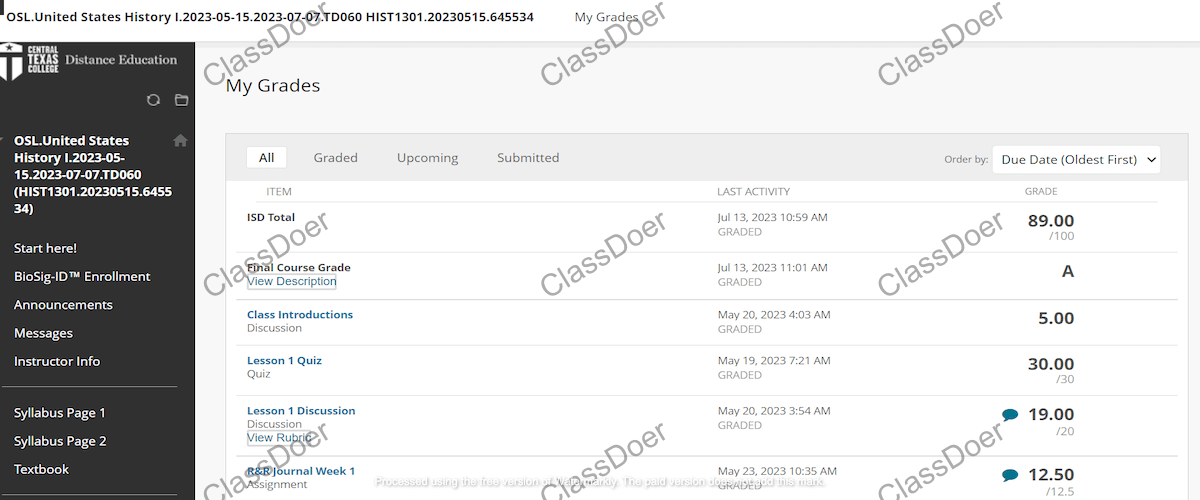
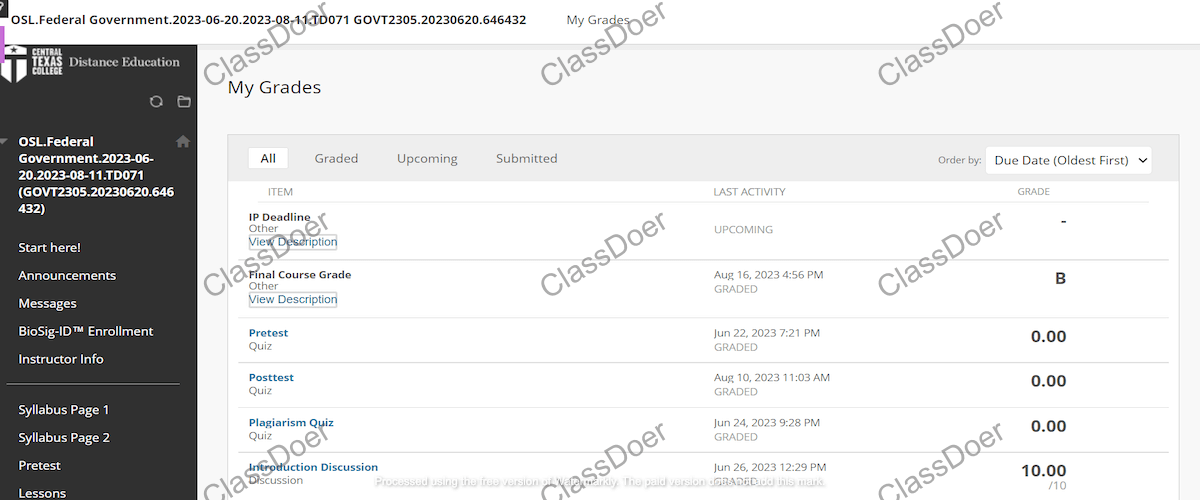
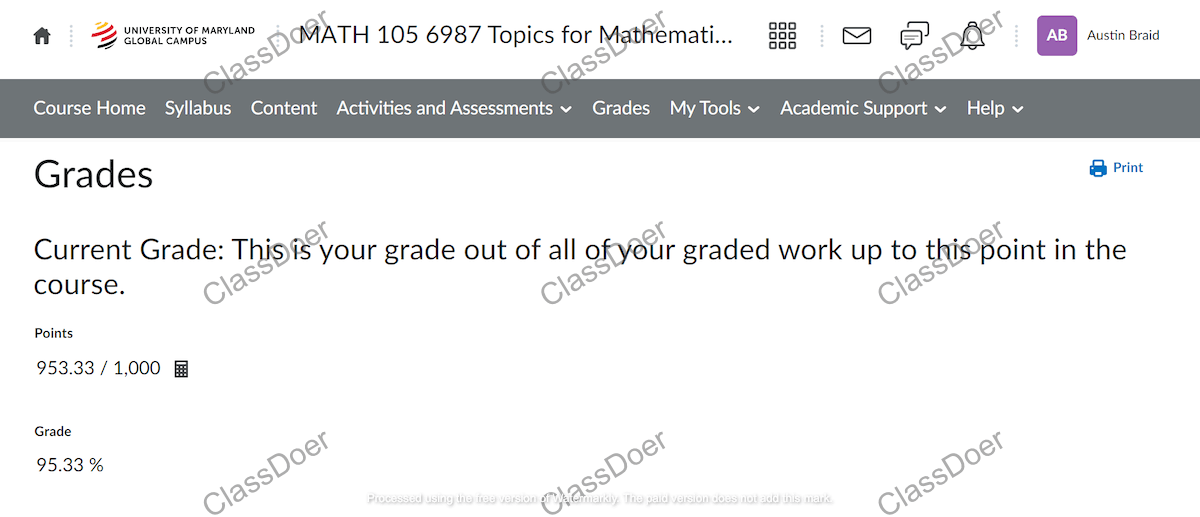
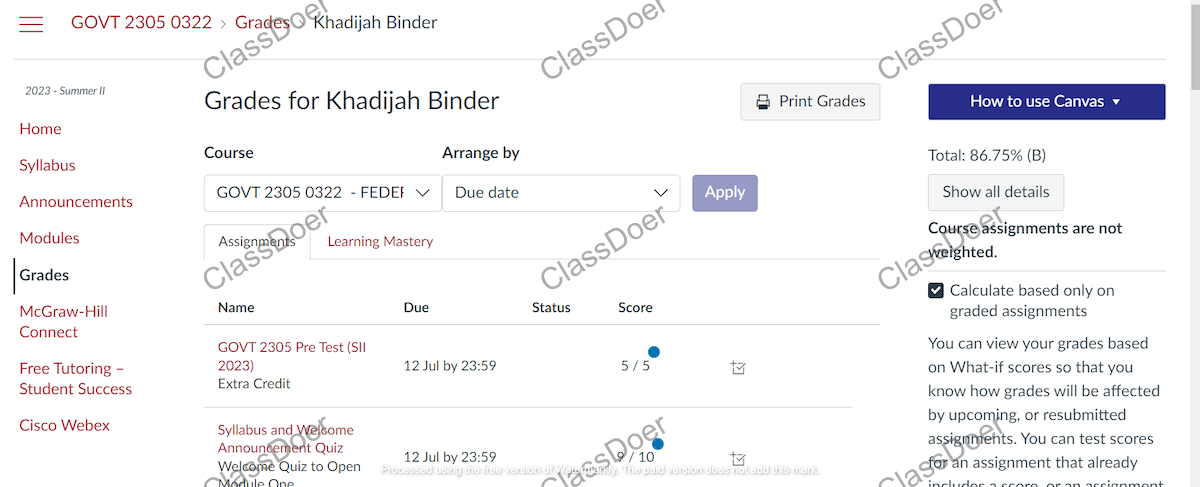
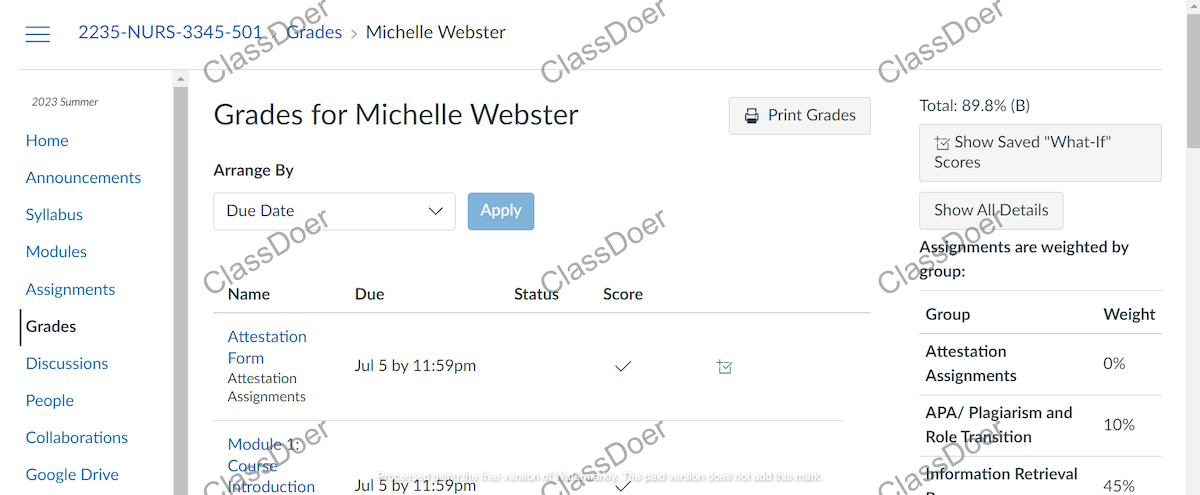

 98% of our client Scored A/B
98% of our client Scored A/B No Guaranteed Grade
No Guaranteed Grade